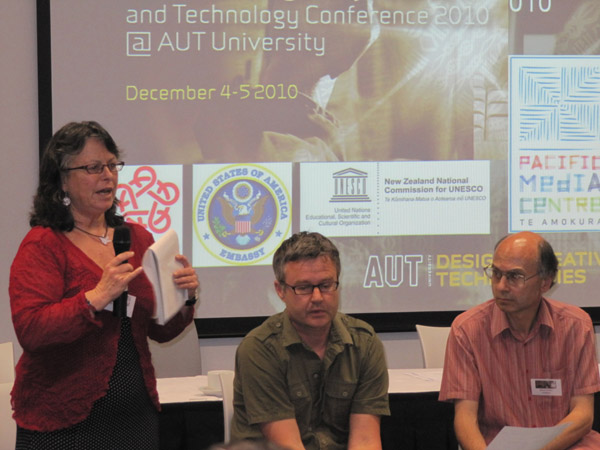
Reflections on the special forum on peace journalism held at the Media, Investigative Journalism and Technology (MIJT) conference on 4/5 December 2010:
To some, a peace journalism forum might have looked idealistic but the participants of the MIJT conference at AUIT University last week did not take long to develop a consensus: Peace journalism is definitely a goal worth striving for.
“Peace Journalism: goal or a dream?” was the theme of the forum organised by the Pacific Media Centre for MIJT. It brought the practitioners, journalists and academics from New Zealand, Pakistan, Fiji, Solomon Island and Australia together to discuss the complexities of the issue for the first time in New Zealand. With various approaches, outlooks and experiences, the discussion was lively, interactive and educative.
The debate started off with convener Dr Heather Devere, of the National Centre for Peace and Conflict Studies, University of Otago, tracing the origins of the concept of peace journalism, starting with the works of John Galtung and how it differed from war journalism. Dr Jane Verbitski, senior lecturer at AUT and a specialist in conflict resolution drew the links between conflict resolution and peace journalism.
I was also in the mix – as an academic and journalist from Pakistan, I dwelt on the challenges and dangers in practising effective peace journalism and how it could be integrated into journalistic training in terms of academic education as well as professional skills.
But it was the real-life stories from the Solomon Islands, Afganistan, Pakistan, Fiji and Tonga that captured the hearts and imagination of the audience. The simple statement from Koroi Hawkins, a television journalist from the Solomon Islands, alone was eloquent enough: “We journalists did not know how to handle the conflict in our region. If we were trained, we would have reported better and perhaps helped saved many lives.”
A similar message came from Shailendra Singh, a journalist and head of journalism studies at the University of the South Pacific in Fiji: “It was after going through conflict situations that we have realised the importance of peace journalism and now efforts are being made to sensitise and train journalists in Fiji although the finding resources and expertise is always a problem.”
Good journalism
So is peace journalism good journalism? Definitely yes, as I pointed out, quoting various research and arguments for this proposition.
Is it easy to practice? Probably not. Journalist Jon Stephenson recalled how hard it was for him as a journalist to cover the current Afghan War when faced with the ethics of journalism and demands from editors: “In a way, peace journalism is closer to investigative journalism and we are seeing in this conference how hard that is to practise.”
Dr Devere and Dr Verbitski thought “there is something about the word ‘peace’ that evokes different responses from different people including ‘unease’ especially from those in power”. And especially when the first thing they tell you in the classrooms is that, ‘If it bleeds, it leads’, said Andrea Steward and Courtney Wilson who have taken journalism courses themselves.
While forum participants are receptive to the idea that journalists would do better with training in peace journalism they have yet to figure out how the ideals of peace journalism be transformed into something more tangible and effective. This forum was the first step in that direction but for starters they have come together and are willing to talk. That is good enough.
David Robie's Cafe Pacific on peace journalism
Media educator calls for 'watchdog plus' role for Pacific media



